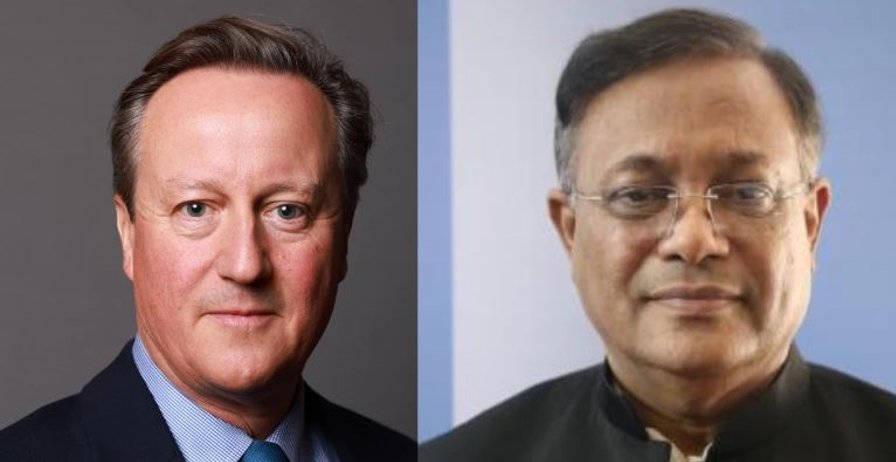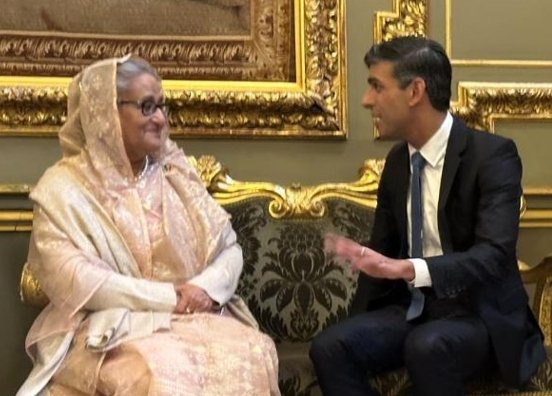Key highlights:
- UK so far provided £370m to Rohingya refugees
- First strategic dialogue held in 2017
- First defense dialogue held in 2022
- Trade and investment dialogue in 2023
Bangladesh and the UK share a longstanding and traditional friendship with deep historical roots. The enduring bond between the two nations is underscored by the key support and assistance extended by the British people across various societal strata and political leaders during the Liberation War in 1971.
The special connection between Bangladesh and the UK was formally established on January 8, 1972, when the then British Prime Minister, Sir Edward Heath, warmly welcomed the Father of the Nation, Bangabandhu Sheikh Mujibur Rahman, in London. This significant meeting, occurring as Sheikh Mujibur Rahman returned to independent Bangladesh from captivity in Pakistan, played a pivotal role in laying the foundation for the special relationship between the two friendly countries.
You can also read: Decoding Biden’s Struggles and Trump’s Resurgence
Notably, the UK emerged as one of the earliest European nations to officially recognize Bangladesh on February 4, 1972. This recognition had a ripple effect, garnering swift acknowledgment from other Commonwealth and Western countries. Bangladesh’s subsequent entry into the Commonwealth on April 18, 1972, further solidified the diplomatic ties between the two nations.
Throughout the Liberation War, the Bangladeshi community residing in the United Kingdom played a crucial role in securing support from both the public and the government of the UK. Even today, with a diaspora numbering around half a million people, this community remains a vital link in the ongoing development of the relationship between Bangladesh and the UK.
Bilateral relationship “evolving”
On January 24, British Foreign Minister David Cameron said that the bilateral relationship between Bangladesh and the UK is “evolving” from being development-focused to a modern economic, security, and migration partnership.
“I hope that by working together we can boost our trade and investment ties, strengthen our security partnership and collaborate on global and regional challenges such as climate change, a free and open lndo-Pacific and the welfare of the Rohingya refugees,” he said in a congratulatory message to newly appointed Bangladeshi Foreign Minister Dr Hasan Mahmud.
The British Foreign Minister also attached “great importance” to progressing cooperation on addressing illegal migration, including from Bangladesh.
“I look forward to hearing your priorities for our relationship and to working together to deliver our mutual interests,” said the Secretary of State for Foreign, Commonwealth and Development Affairs.

Congratulating Hasan on his appointment as Foreign Minister of Bangladesh following the recent elections, the British Foreign Minister said, “I look forward to working with you, building on our deep shared history, people-to-people ties, and wide-ranging shared interests and values.”
“The recent statement issued by the Foreign, Commonwealth and Development Office reflected these values and set out their views on democracy and human rights,” he added.
Assistance to Rohingya refugees
Up to now, the United Kingdom has provided £370 million to address the ‘Rohingya’ crisis by providing food, water and sanitation, healthcare and protection services that are vital for women and girls in the refugee camps in Cox’s Bazar.
The United Kingdom played a leading role in addressing the issue at the United Nations Security Council. UK Ministers and Members of Parliament actively voiced their concerns in Select Committees, parliamentary debates, and public forums, aimed at creating pressure on Myanmar to address the situation and take necessary actions.
PM’s visit to London
In May 2023, heads of state and government from 130 countries arrived in London to attend the coronation of King Charles III at Westminster Abbey. Bangladesh Prime Minister Sheikh Hasina was one of them. On May 5, 2023, she met her British counterpart Rishi Sunak at the Commonwealth Secretariat’s Bilateral Meeting Room in London.

“I am following you for many years. You’re a successful economic leader.”
– British PM Rishi Sunak tells Bangladeshi counterpart
Bangladesh High Commissioner to the UK Saida Muna Tasneem said, “At that time, the British PM Rishi Sunak had meetings with only seven of the 130 heads of state and government which manifests that Bangladesh has wonderful relations with the UK.”
The two leaders discussed various issues related to the mutual benefits of the two countries in their meeting, which lasted for 35 minutes. At the meeting, Sunak told Hasina, “I am following you for many years. You’re a successful economic leader.”
He also said that his two daughters and wife are admirers of Hasina, and he wished his daughters to be great leaders like her.
Earlier in 2018, Prime Minister Sheikh Hasina led the Bangladesh delegation when the UK hosted the 25th meeting of the Commonwealth Heads of Government held from April 19-20. Heads of state/government from 47 Commonwealth member states, and minister-level delegations from the rest attended the summit.
Strategic dialogues with the UK
On September 12, 2023, Bangladesh and the UK held their fifth strategic dialogue, marking a significant milestone in their bilateral relationship. The discussion focused on the future of Bangladesh’s post-Brexit ties with the UK, with concerns initially raised about Bangladesh’s duty-free access to the UK. Both countries, however, weathered these worries quite well, emphasizing the growing strength of their economic, trade, and development partnerships, as well as collaboration on regional and global security issues.
The statement by FCDO Permanent Under-Secretary Sir Philip Barton during the dialogue, sums up the strength of Bangladesh-UK relations in current times: “The Dialogue is a reflection of the growing relationship between our two countries, and our desire to work together more closely on our economic, trade and development partnerships and regional and global security issues.”
Deepened cooperation and connectivity: Throughout the last year, Bangladesh and the UK deepened their cooperation and connectivity. The year 2023 is seen as a turning point, as the two countries shifted their relationship from a bilateral partnership to a crucial strategic partnership in current geopolitics.
First defense dialogue: In the first-ever defense dialogue between Bangladesh and the UK held in March 2022,various ways of strengthening cooperation including defense, security trade, and climate change were discussed.
Trade and investment dialogue: The year 2023 started with the second Bangladesh-UK Trade and Investment Dialogue held in February, where both countries expressed a shared commitment to enhancing their trade connections for mutual prosperity.
Collaboration on climate action: The dialogue was followed by signing an agreement in March to collaborate on climate actionbilaterally, addressing outcomes from COP26 and COP27. The UK’s recognition of Bangladesh’s geostrategic importance in the Bay of Bengal and the Indian Ocean was highlighted by the agreement signed by the UK’s Indo-Pacific Minister Anne-Marie Trevelyan during her visit to Bangladesh.
Agendas Addressed in 2023
The strategic dialogue in 2023 covered various crucial topics, including the state visit of President Mohammed Shahabuddin to the UK in November, a potential visit by British King Charles III to Bangladesh in 2024, bilateral trade and investment opportunities, migration, mobility, and a new visa scheme for students. Discussions also touched on global issues such as the Russia-Ukraine conflict and the Rohingya crisis.
The more complex agendas this year include discussions on mutual legal assistance and the extradition of convicted persons. Despite fruitful discussions, Bangladesh failed to secure an extradition treaty with the UK. If the discussions regarding extradition issues were fruitful, it might have helped the government to bring fugitives living in the UK to justice finally.
However, both countries agreed to form a joint working group to address migration, mobility, and mutual recognition of qualifications, with plans to sign a standard operating procedure (SOP) on the return of Bangladesh nationals in irregular situations in the UK.
Previous Strategic Dialogues
The strategic dialogues between the two countries in recent years have usually brought deep discussions and decisions on bilateral issues.
In the first strategic dialogue held in 2017, the issue of defense purchase was discussed- a much needed ground setting for the Forces Goals 2030 of Bangladesh. On the last edition of this dialogue, held in London back in 2021, the UK pledged to extend duty-free, quota-free access to its market until 2029, aiming to facilitate Bangladesh’s export-led growth.
In addition to the various collaborative efforts, the UK also included Bangladesh in the Developing Countries Trading Scheme (DCTS). This move ensures that Bangladesh benefits from a simplified regulatory system and reduced tariffs on its products when entering the UK. This inclusion in the DCTS is a clear indication of the UK’s dedication to supporting Bangladesh’s growth and development. It reinforces the UK’s position as one of the significant development partners for Bangladesh, further strengthening the economic ties between the two nations.
The UK’s generosity towards Bangladesh is not only altruistic but also strategic, as the UK seeks to expand its reach beyond the EU. The Indo-Pacific region is a preferred focus, and Bangladesh’s geostrategic location makes it an ideal partner for the UK’s interests. Both countries have also announced their Indo-pacific policies which focus mainly on their economic aspirations. With such resonating goals for the region, the countries can build a bigger stage of collaboration with each other.
Conclusion
Both countries agreed to establish new institutional cooperation to promote business, trade, and investment. Discussions also included potential cooperation on global and regional security issues, with a focus on maritime and blue economy goals in the Bay of Bengal.
Discussions on defense cooperation revealed the UK’s interest in selling advanced weapons to Bangladesh to safeguard its air and maritime territory.
the strategic dialogue strengthened the bilateral ties between Bangladesh and the UK, marking a new phase of enhanced economic cooperation and shared strategic interests.


